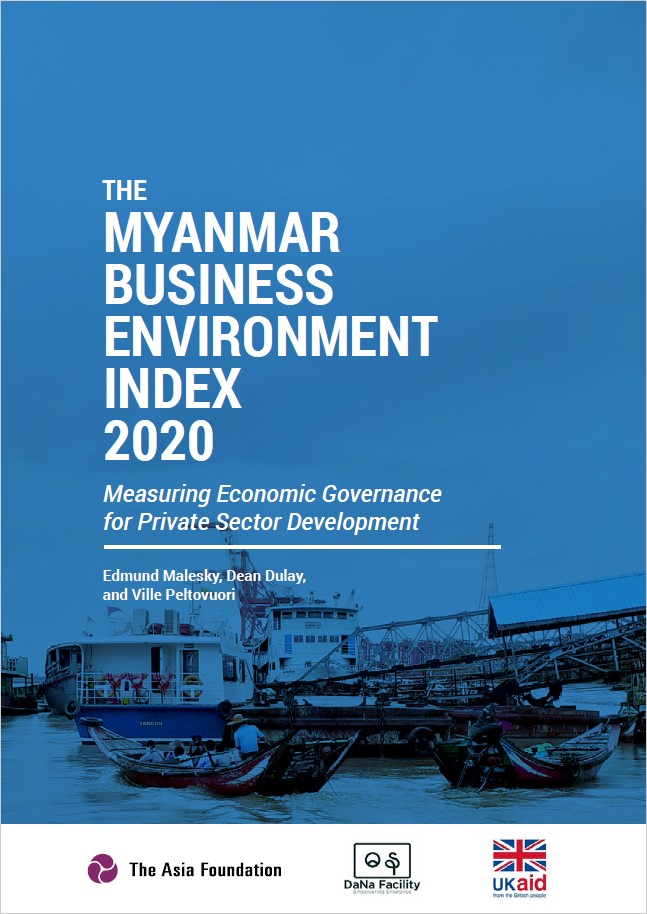About the Myanmar Business Environment Index
 Economic growth is a major priority of the Myanmar government and Myanmar’s private sector will play an important part in achieving this goal. Private enterprises attract investment, create jobs, and develop business models that protect communities and the environment from harm. However, despite recent economic reforms, Myanmar continues to face major challenges to achieving sustainable and inclusive economic growth. Many small and medium enterprises (SMEs) across the country suffer from a lack of capital, inadequate infrastructure, and complex or unclear licensing and regulatory procedures. The government of Myanmar can begin to address many of these challenges through improvements in economic governance, or the set of activities through which policy-makers and administrators ensure a suitable environment for private business activity. However, doing so involves identifying the strengths and weaknesses in economic governance in Myanmar and providing national and state/region governments with the tools needed to implement reforms.
Economic growth is a major priority of the Myanmar government and Myanmar’s private sector will play an important part in achieving this goal. Private enterprises attract investment, create jobs, and develop business models that protect communities and the environment from harm. However, despite recent economic reforms, Myanmar continues to face major challenges to achieving sustainable and inclusive economic growth. Many small and medium enterprises (SMEs) across the country suffer from a lack of capital, inadequate infrastructure, and complex or unclear licensing and regulatory procedures. The government of Myanmar can begin to address many of these challenges through improvements in economic governance, or the set of activities through which policy-makers and administrators ensure a suitable environment for private business activity. However, doing so involves identifying the strengths and weaknesses in economic governance in Myanmar and providing national and state/region governments with the tools needed to implement reforms.
The Myanmar Business Environment Index (MBEI) seeks to provide government, businesses and other stakeholders with a tool to better understand economic governance in Myanmar and thereby support sustainable and inclusive future economic growth. The MBEI is an economic governance index (EGI), or a specialized instrument for measuring the performance of local authorities and assessing improvements in the local business environment through quantitative indicators. EGIs have been used in Indonesia, Sri Lanka, Bangladesh, Cambodia, and Mongolia, and in Vietnam, and they have become a widely-accepted tool for understanding economic growth, attracting investors, and promoting public-private dialogue. In 2017, The Asia Foundation (TAF) and the DaNa Facility, with funding from UK Aid, launched the three-year Myanmar Business Environment Index (MBEI)to adapt the EGI tool to the Myanmar context. Development in partnership with the Development Lab at Duke University, the MBEI measures economic governance at the national and state/region levels in order to identify constraints in Myanmar’s business environment and identify opportunities for reform.
The MBEI measures economic governance in Myanmar by collecting data on ten distinct topics or subindices. These topics include: 1) Entry Costs, 2) Land Access and Security, 3) Post-Entry Regulation, 4) Informal Payments, 5) Infrastructure, 6) Transparency, 7) Favoritism in Policy, 8) Environmental Compliance, 9) Labor Recruitment, and 10) Law and Order. Each MBEI subindex consists of roughly ten indicators, which include a combination of administrative and observational data and survey data. For 2019 MBEI, the data were collected from 4,874 Myanmar businesses in 67 townships throughout the country.
The Myanmar Business Environment Index provides the clearest picture to date of economic governance in Myanmar as well as valuable insight into Myanmar’s business environment at the state/region and township levels. In 2020, The Asia Foundation has conducted the second round of data collection in order to update findings and track changes in economic governance in Myanmar. The survey data are collected from 5,605 business in 76 townships across the country. MBEI data at the township, state/region and national level, and a full description of the MBEI methodology are provided in the 2020 report. Methodological improvements and new indicators have been developed in 2020 MBEI to provide better aspects of the business environment for decision-makers.

